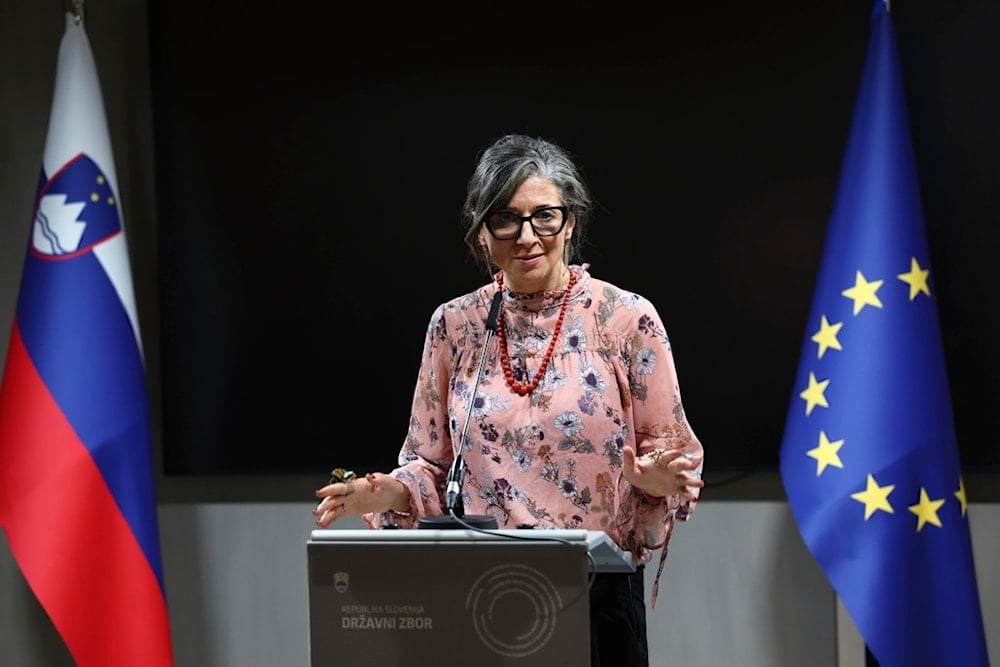EU 'deeply regrets' US sanctions on UN Palestine Rapporteur Albanese
The European Union expressed its regrets regarding the United States’ sanctions on UN expert Francesca Albanese.
-

Francesca Albanese, UN Special Rapporteur for the occupied Palestinian territories speaks during a press conference, in Ljubljana, Slovenia, Thursday, July 10, 2025. (AP Photo)
The European Union has voiced disapproval of the United States' decision to sanction Francesca Albanese, the UN Special Rapporteur on human rights in the occupied Palestinian territories, over her efforts to expose Israeli war crimes in Gaza and advocate for accountability through the International Criminal Court (ICC).
Speaking on Friday, European Commission foreign affairs spokesperson Anouar El Anouni reaffirmed the bloc's support for international human rights mechanisms and denounced Washington's move. "The EU firmly supports the UN Human Rights system and we deeply regret the decision to impose sanctions on Francesca Albanese," he said.
"The EU will continue to support efforts seeking to undertake independent investigations into human rights abuses and violations of humanitarian law."
The US announcement, delivered Wednesday by Secretary of State Marco Rubio, accused Albanese of waging "lawfare" by urging the ICC to pursue legal action against American and Israeli officials for their role in the mass slaughter and destruction in Gaza. Rubio threatened that the US "will continue to take whatever actions we deem necessary" to protect itself and its allies from legal scrutiny.
Albanese, a seasoned human rights lawyer, has been one of the few international voices to call "Israel's" Gaza campaign what it is: a genocide. On July 3, she described it as "one of the cruelest genocides in modern history," citing the deliberate destruction of civilian infrastructure, systematic starvation, and indiscriminate bombing of densely populated areas.
Sanctioning Truth, Shielding Genocide
In November 2024, the ICC issued arrest warrants for Israeli Prime Minister Benjamin Netanyahu and former Security Minister Yoav Gallant, citing credible evidence of war crimes and crimes against humanity. The indictments followed months of relentless Israeli bombardment following the October 7 events. According to the latest estimates, its genocidal campaign has killed over 57,700 Palestinians, many of them women and children, and decimated Gaza's health, education, and food systems.
Albanese's reports have gone further, naming dozens of multinational corporations, among them Alphabet, Lockheed Martin, and Caterpillar, as complicit in enabling "Israel's" apartheid system and its war on Gaza. Her bold stance has earned her fierce backlash from the US and Israeli figures, but also widespread support from human rights defenders worldwide.
Read more: US sanctions on Albanese shamefully undermine justice: Amnesty
Iran condemned the sanctions as a blatant attempt to silence truth-tellers. "Francesca Albanese is bullied and sanctioned for telling the truth & for standing up against genocide, occupation, and apartheid," Foreign Ministry spokesperson Esmaeil Baghaei said, contrasting the treatment of Albanese with the red-carpet welcome extended to Netanyahu, whom many now regard as a war criminal.
The United Nations also responded forcefully. Spokesperson Stéphane Dujarric said the targeting of Albanese "sets a dangerous precedent," while UN High Commissioner for Human Rights Volker Türk decried the growing trend of threats and political retaliation against UN officials and ICC judges.
Read more: UN Rapporteur Albanese threatened over report on Gaza genocide
'Let's stand tall'
Despite the pressure, Albanese remains resolute. "Let's stand tall, together," she wrote, calling on the international community not to be distracted from the ongoing horrors in Gaza. "All eyes must remain on Gaza, where children are dying of starvation in their mothers' arms."
The Trump administration's move is seen by many as part of a broader crackdown on pro-Palestinian advocacy and accountability. From university campuses to international institutions, efforts to challenge Israeli impunity are increasingly met with censorship, legal threats, and economic retaliation.
But as the death toll mounts and the humanitarian catastrophe deepens, Albanese's voice, along with those of countless Palestinians and their allies, continues to demand justice.

 4 Min Read
4 Min Read









